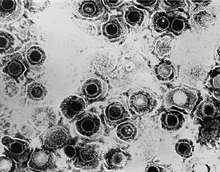Talimogene laherparepvec

Transmission electron micrograph of an unmodified herpes simplex virus
|
|
| Clinical data | |
|---|---|
| Pregnancy category |
|
| Routes of administration |
Injection |
| ATC code | |
| Legal status | |
| Legal status |
|
| Identifiers | |
| CAS Number | |
| ChemSpider |
|
Talimogene laherparepvec (tal im' oh jeen la her" pa rep' vek), (T-Vec, tradenamed Imlygic, formerly called OncoVexGM-CSF) is a biopharmaceutical drug to treat melanoma lesions that cannot be operated on; it is injected directly into the lesion. As of 2016 there was no evidence that it extends the life of people with melanoma, or that it prevents metastasis.
Around half of people treated with T-Vec in clinical trials experienced fatigue and chills; around 40% had fever, around 35% had nausea, and around 30% had flu-like symptoms as well as pain at the injection site. The reactions were mild to moderate in severity; 2% of people had severe reactions and these were generally cellulitis.
T-Vec is a genetically engineered herpes virus (an oncolytic herpes virus). Two genes were removed – one that shuts down an individual cell's defenses, and another that helps the virus evade the immune system –, and a gene for human GM-CSF was added. The drug works by replicating in cancer cells, causing them to burst; it was also designed to stimulate an immune response but as of 2016, there was no evidence of this.
The drug was created and initially developed by BioVex, Inc. and was continued by Amgen, which acquired BioVex in 2011. It was the first oncolytic virus approved in the West; it was approved in the US in October 2015 and provisionally approved in Europe in December 2015.
T-Vec is delivered locally by injecting it directly into melanoma lesions.
In the US and Europe, T-Vec is used to treat melanoma lesions that cannot be operated on that are on or in the skin it is injected directly into the lesion; the population is more restricted in Europe.
It has not been proven to extend survival nor to prevent metastases.
The drug should not be used for people with very weak immune system. Women should take precautions not to become pregnant while taking T-Vec and pregnant and nursing women should not take it.
Around half of people treated with T-Vec in clinical trials experienced fatigue and chills; around 40% had fever, around 35% had nausea, and around 30% had flu-like symptoms as well as pain at the injection site. The reactions were mild to moderate in severity; 2% of people had severe reactions and these were generally cellulitis.
...
Wikipedia
